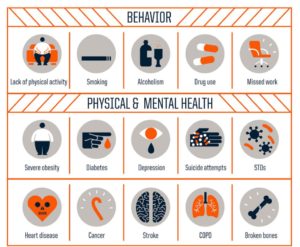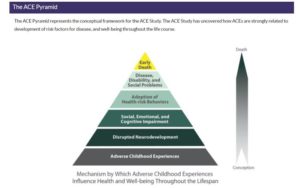Day 3 Aha: ACE Scores Matter & How Not to Die Early
On 60 Minutes, Oprah reported the following:
“For anyone, a high score on the ACE test is a powerful predictor of physical and mental problems down the road. According to the Centers for Disease Control, it makes you five times as likely to be depressed and can cut your overall life expectancy by as much as twenty years.
The CDC says this isn’t theory, it’s scientific fact, backed up by hundreds of published studies. And, the CDC says, one out of every eight children suffers enough trauma to cause lasting damage.”
What the what?
This is stuff we need to know. There are hundreds of studies and articles which detail ALL the things high ACE scorers are at risk for. I’ll share a few images.
Here’s one from NPR.

Here’s another from the Centers for Disease Control and Prevention (CDC).

My question is simple?
How do I not die early?
That’s rather urgent.
Right now. Especially is one is say, over 50.
Of course, it’s important to fund research for the prevention of ACEs but that’s not going to help a whole bunch of us. While we are still kicking, we’d love ways to get back some years. Ways that are practical, accessible, and fast acting.
That’s hard to find. Often, if we even dare to share about past trauma or current ACE scores, we often have to educate providers about why that matters or are handed off to behavioral health, social workers or therapy as though we are the infectious or contagious things that belong in those red bags or “medical waste” boxes. This is a cop-out response. It does little to address our physical health threats, risks, and needs.
Plus, therapy is not appealing, affordable or practical options for everyone, especially when provided by someone who doesn’t get what it likes to manage post-traumatic stress as a kid and as an adult. What we need is daily support from the places we live, work and learn.
School.
Our communities.
Work.
Each other.
We need the burden not to be so big as many of us don’t have traditional families of origin to lean on or into. That doesn’t mean we aren’t loved or loving our relatives, but if we have a high ACE score, it’s likely we aren’t alone with that. We and our families members are often running on empty and don’t have as much to give of ourselves as we’d like.
For me, as an adult, two things were important.
- Attachment-style parenting (for my kid)
- A don’t die early plan.
I needed to learn a lot about ACEs before I could even approach, articulate or start to implement anything. To be honest, prioritizing self-care is important but not intuitive. I find attachment parenting easier because it’s harder blow off my kid (thank goodness) than it is to blow off myself. We’ll come back to parenting another day.
As for not dying early, I did go to a functional nurse practitioner and asked for some help. I shared all about ACEs, the ACE study, and my ACE score. While she hadn’t heard of it she was well versed in how chronic stress can be harmful for health. She was optimistic that with modifications I could cut my health risks down by about half.
Half is a full decade, which is good, but I’d like a normal lifespan thank-you-very much.
Where is that research that shows us how to get back all of the years we are at risk of losing? I get that we can’t change the past but if we can prevent misery and disease, I’m all in.
And come with side effects. Not all love, appreciate or benefit from the diagnose-the-symptoms model or simply wish to supplement it with other options. Therapy and medication (treatments of choices), while life-saving for many, can be stigmatizing, shaming and make life harder for some. What if we just want happiness and good health outcomes no matter what the past? Why should this be a DIY research project for so many survivors?
Tomorrow I”ll share details about the DINE plan from Nurse Practitioner, Lisa Vasile, for those with high ACEs wondering what to do now to live into your 80’s or beyond.
Here’s a preview of what she shared with me.
D is for Detox.
I is for Inflammation.
N is for Nutrition.
E is for Energy.
Day 4 Preview: Can We Start with Not Dying Early?
You Matter Mantras
- Trauma sucks. You don't.
- Write to express not to impress.
- It's not trauma informed if it's not informed by trauma survivors.
- Breathing isn't optional.
You Are Invited Too & To:
- Heal Write Now on Facebook
- Parenting with ACEs at the ACEsConectionNetwork
- The #FacesOfPTSD campaign.
- When I'm not post-traumatically pissed or stressed I try to Twitter, Instagram & Pinterest.
[…] Days After Oprah on 60 Minutes Series ( Day 3, Day 2, Day […]